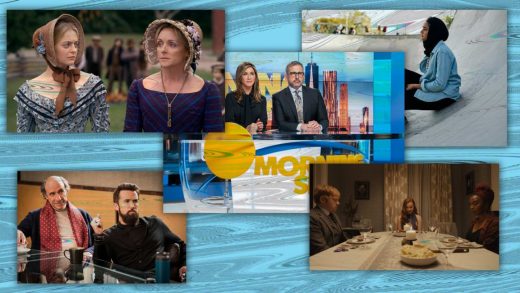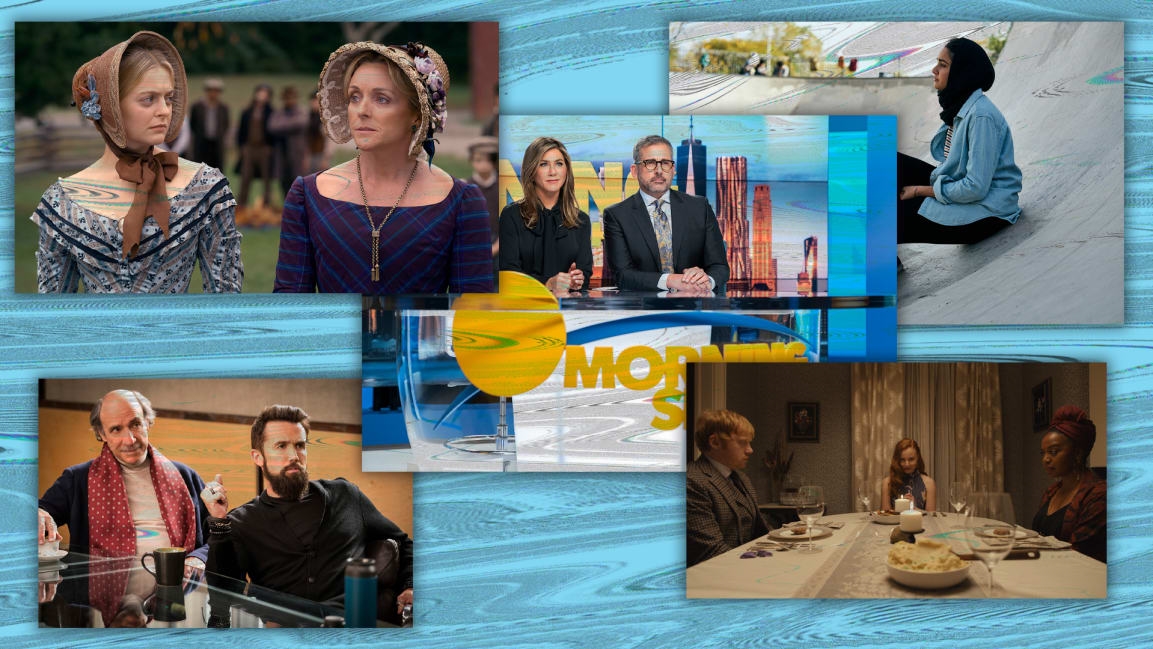Apple TV Plus secretly won the streaming war of 2020. Here’s why
The streaming wars entered an exhausting new phase this past year, marked by an onslaught of buzzy major platforms, teeming with high-profile projects.
Last week, Quibi became the first casualty of this escalation, fulfilling its schadenfreude-stuffed destiny as a cautionary tale. But if the clear loser of the new batch of streamers is the misguided brainchild of Jeffrey Katzenberg—who dared to ask, “What if YouTube was mostly A-listers’ leftovers?”—perhaps it’s time to declare a winner as well.
On the eve of its first anniversary, Apple TV Plus is the service whose original content has come closest to establishing an identity—and the one whose future is most promising.
When Apple CEO Tim Cook first engaged in conversations to create original programming for a hypothetical Apple streaming service back in 2016, it didn’t sound like a great idea. The sheer gall of thinking content development was the same as UX design, and that Apple could optimize movies and TV shows like iPhones!
At least the company would have Apple money to burn. In 2018, it signed development deals with Oprah Winfrey, Steven Spielberg, and the Sesame Workshop, and corralled the acting talents of high-wattage stars Jennifer Aniston, Reese Witherspoon, and Steve Carrell for Apple’s first major series, The Morning Show.
Once things started cooking, however, the early word was alarming. Cook reportedly wanted more family-friendly shows, with reports indicating that he’d ordered The Morning Show be toned down and that Apple had passed on a #MeToo-themed series from comedian Whitney Cummings because it was “too sensitive a topic.”
Would Apple TV Plus arrive fully defanged and neutered?
On November 1, 2019, the platform launched—at a $4.99 per month price point—with four flagship shows. The Jason Momoa-starring warrior epic, See, was most notable for its Game of Thrones-size budget, while For All Mankind boasted Battlestar Galactica creator Ronald D. Moore tackling an alt-history take on the U.S. aerospace program. Neither series generated much in the way of conversation or found very vocal fans. The Morning Show, however, went all in on its Matt Lauer-esque #MeToo plot, dampening those early rumors of topic sensitivity. Critics panned the show based on its early episodes, and it quickly developed a reputation as a media hate-watch. But the show got better as it progressed, ultimately building to a satisfying indictment of top-down toxicity at networks. The show then went on to be nominated for eight Emmys, with a win for Billy Crudup’s gloriously hammy turn as an amoral executive. When combined with the cultural success of the delightfully anachronistic, twisted Dickinson, which found a lot of young fans, the show ultimately accomplished most of what Apple wanted it to do. (Read: Put Apple TV Plus on the map.)
It’s hard to assess a new network’s original programming slate all at once. That’s not what audiences were asked to do with Netflix, which first released House of Cards in early 2013 and then Orange Is the New Black later that summer; nor is it how Amazon Prime or Hulu first made their marks with original content. While all of Apple TV Plus’s shows were renewed immediately, it wasn’t because any of them necessarily brought in the kind of rapturous universal acclaim that House of Cards received. Ultimately, viewers needed to see more from the platform to know if it justified its existence.
In the meantime, there were the other services to contend with: Disney Plus, Quibi, HBO Max, and Peacock, which rolled out in that order over the next nine months.
Quibi, as indicated above, was an unfortunate misfire from the moment it arrived, with Katzenberg paradoxically blaming pandemic lockdown for, uh, nobody . . . having the desire to watch things? (After Quibi folded, he recanted this stance a bit.) HBO Max says it’s doing well, with its stand-out originals mostly emanating from unscripted series like the ball culture competition, Legendary; the canine-grooming series, Haute Dog; and Serena Gomez’s charming Serena + Chef cooking instructional. In the scripted realm, Anna Kendrick rom-com, Love Life, was met with eye rolls and sighs, and the sci-fi series, Raised by Wolves, was more of a compellingly peculiar curio than an outright hit. Peacock—like HBO Max—has a solid back catalog, with The Office also due in 2021, but none of its original programming has caught on so far, outside of The Amber Ruffin Show, which in its first month has started to attract some attention.
That only leaves Disney Plus as Apple Plus’s distinguished competition in scripted original programming.
Besides its vault brimming over with Disney classics, Marvel movies, and the entire Star Wars series, Disney Plus launched 12 days after Apple TV Plus, with one killer new piece of IP: The Mandalorian. Jon Favreau‘s first stab at making TV was a huge hit, fulfilling every hope for what a Star Wars serial beyond the Skywalker saga could be. But what of the platform’s other series? The platform announced several further Star Wars shows, with names such as Taika Waititi and Leslye Headland attached to develop, but they’re all a long ways off. So many Marvel shows are coming down the pike as well—set to tie into the Marvel Cinematic Universe in a way that Netflix’s Marvel shows and ABC’s Agents of S.H.I.E.L.D. never could. But whether due to the limited possibilities of filming during the pandemic, or Disney’s strategy to lean on its catalog and not chase Netflix in spending on originals, none of these series has actually launched yet. While WandaVision is tentatively scheduled for December 2020, with Loki and The Falcon and the Winter Soldier due sometime after that, no official release dates have yet been announced. The massively anticipated second season of The Mandalorian began streaming on Friday, October 30, but the excitement around it only underscores how Disney Plus doesn’t really have any original shows yet other than The Mandalorian. At least it has some new movies, as the pandemic ultimately forced Disney Plus to release Hamilton in July and its would-be blockbuster live-action remake of Mulan as a PVOD option back in September.
But Apple TV Plus didn’t waste the theatrical release crisis of the pandemic either.
First, the platform picked up Beastie Boys Story in late spring, once it was clear the film wouldn’t make it to theaters. Then it purchased the Tom Hanks World War II movie Greyhound from Sony for $70 million and released it in July, when dads everywhere sung its praises to the rafters. The company reportedly considered a $350 million to $400 million offer for the rights to stream Daniel Craig’s final James Bond film, No Time to Die, although MGM apparently was unwilling to accept anything lower than substantially more money. Apple TV Plus merely had to content viewers instead with the heady A24 documentary film, Boys State, and Sofia Coppola’s reunion with Bill Murray, On the Rocks.
By the time these movies started hitting the service, though, Apple TV Plus had already started getting attention for its other original series. Among many more offerings, some of the standouts were M. Night Shyamalan’s Servant; Mythic Quest: Raven’s Banquet, from the It’s Always Sunny in Philadelphia team, a show that had the best COVID-19 episode of any series I’ve seen to date; Defending Jacob, a tense legal thriller starring Chris Evans; and Central Park, a musical series from the Bobs Burgers crew. Many of these shows earned as much praise as Apple’s initial four shows, with Defending Jacob coming closest to breakout status.
But the biggest hit was yet to come.
In August, Apple TV Plus debuted its most well-received series yet, Ted Lasso. An unlikely hit on paper, Lasso stars Jason Sudeikis as an American football coach taking on London’s Premier League, based on a series of commercials the comedy star created for NBC’s Premier League coverage. Working with Scrubs creator Bill Lawrence, Sudeikis’s series is a full-court charm offensive, with lots of heart and solid joke writing, that has been steadily winning over more and more fans in the months since its release. By the time it airs its eventual second and just-announced third seasons, demand for the show could grow to rabid levels.
And if all of Apple’s existing deals pan out, Apple TV Plus will eventually also have a new comedy series starring Seth Rogen and Rose Byrne; an Elisabeth Moss vehicle; a series from Phil Lord and Chris Miller; a Velvet Underground biopic from director Todd Haynes; an adaptation of acclaimed novel Pachinko; a return to TV from Jon Stewart; a Hedy Lamar doc starring Gal Gadot; Martin Scorsese’s Killers of the Flower Moon, starring Leonardo DiCaprio and Robert De Niro; a Will Ferrell and Paul Rudd limited series; a show about WeWork; a Mahershala Ali movie; Stephen King adapting his own book Lisey’s Story for a series; a Brie Larson show; a series directed by Taika Waititi; a narrative show about the early days of Gawker; and a Damien Chazelle project. With no library of old shows like HBO Max or Peacock, Apple has had to start from scratch, and this development pipeline is an encouraging sign that it’s building a formidable roster.
Apple TV Plus may not have a specific prestige aesthetic yet, the way HBO shows once felt like HBO shows and AMC shows felt like AMC shows, but what it does have is momentum and potential. While the must-see Disney Plus original content beyond Mandalorian still seems stalled in a galaxy far, far away, Apple TV Plus has a treasure trove of decent-to-great programming to tap into right now.
It hurts to admit it, but maybe, just maybe, Tim Cook really did optimize entertainment the way Apple does smartphones. Or he came close enough, anyway.
Fast Company , Read Full Story
(38)



